11 Pool Chlorine Alternatives for a More Enjoyable Swim
Author: Chris Miller | Editor: Omar Alonso
Review & Research: Jen Worst & Chris Miller
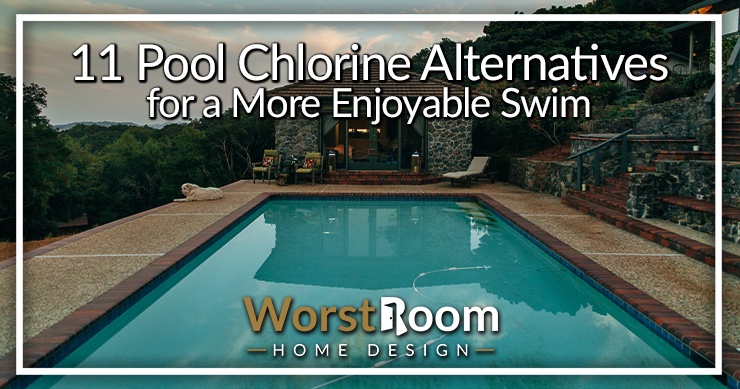
Any pool, whether it is commercial or residential, must be sanitized with chlorine or pool chlorine alternatives to keep it free of pathogens that can be hazardous to health, prevent the formation of algae, and control organic debris from body oils, perspiration, etc.
Chlorine is the most commonly used chemical used to clean pools the world over because it is inexpensive, easy to use and very effective as well.
However, chlorine isn’t very popular because of the strong, chemical smell, causing red eyes, dry skin and allergic reactions. You also need to check your pool’s pH regularly and adjust it, otherwise, the chlorine will become less effective.
11 Pool Chlorine Alternatives
You don't want to use chlorine, and you've just filled the pool with water, so now what? Several pool owners don’t prefer the option of using chlorine to keep the pool clean and are on the lookout for safer and more reliable alternatives and in this article, we’ll give you a lowdown on some of the best pool chlorine alternatives that you can choose from.
Salt Water
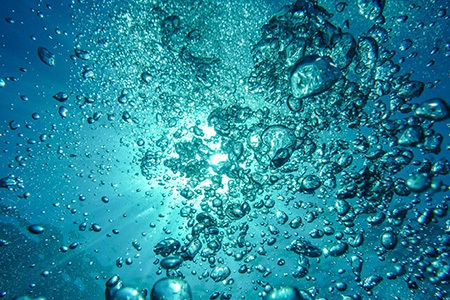
Saltwater pools produce chlorine using salt in a way that the chemical doesn’t dry your skin, smell or irritate your eyes and so, salt has become a very popular alternative to pool chlorine.
The process involves salt passing via a salt cell, which breaks down into chlorine when it gets an electric charge that helps to keep the levels of chloramines low and free chlorine high.
The free chlorine helps to keep the pool water clean and crystal clear and since the chloramine levels are low, you won’t have a problem with the strong chlorine smell and skin irritation.
The balanced salinity and low chloramine levels make the pool water comfortable and pleasant to swim in. This is what alternatives to chlorine for swimming pools can provide.
This is an interesting option for zero-entry swimming pools, often called beach-entry pools, which can help it mimic the experience of being in and at the ocean.
Also, salt is much cheaper compared to the chemicals required to clean the pool. The only thing to keep in mind is that the salt chlorinator or salt cells must be cleaned regularly. Also, these need to be replaced every 3 to 5 years.
Bromine
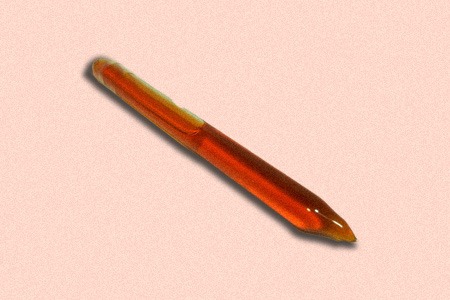
An effective sanitizer, bromine is commonly used as a substitute for chlorine. Bromine is a halogenic compound and has similar properties to chlorine, making it a very solid chlorine alternative for your pool.
However, bromine is more expensive compared to chlorine and if you’re fine with the extra cost, then bromine is a good alternative, because not only is it more stable than chlorine but it also doesn’t require a lot of testing.
While bromine still produces a strong smell, it doesn’t irritate the skin and eyes thanks to being one of the pool chlorine alternatives that doesn't feature the harsh chemical.
Just like chlorine, bromine too needs to be used along with other additives and chemicals in pools. Bromine can’t be stabilized against the UV rays from the sun, which reduces the effectiveness of bromine and needs quite a lot of chemicals to sanitize the pool.
Thus, bromine works better in spas and indoor pools, which are sheltered from sunlight and don’t do very well for outdoor pools. The key thing to understand is chlorine kills off contaminants faster but bromine lasts longer.
Ozone
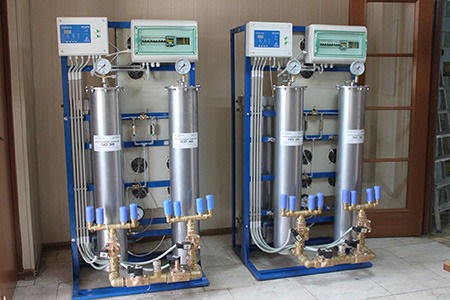
Ozone generators are usually attached to the pool filtration, which introduces ozone gas i.e., an active form of oxygen, into the pool, which reacts with the organic contaminants in the pool and breaks them down.
Ozonation helps to reduce the use of chlorine by 60% to 90%. There are two types of ozonators—corona discharge and UV light. Up to 90% means that ozonation methods are serious chlorine alternatives for pools.
Corona discharge ozonators depend on an electric arc that creates ozone in the generator, which helps to kill all the bacteria and other pathogens in the pool filtration system.
The UV light system makes use of low-pressure vapor lamps that are installed in the return line. These create ozone, which helps to kill the pathogens in the water.
However, ozone can’t be used independently and must be used along with some other sanitizer or chlorine. Also, ozone generators are quite expensive.
Ozone generators work best in dry conditions and hence, if you live in an area with a humid climate, then the effectiveness of the ozonator may reduce.
Another point to note is that ozone generators are effective when the ozone combines with chlorine and the water is circulated round the clock. So this works best not as alternatives to chlorine in pools but in combination with it.
Mineral System
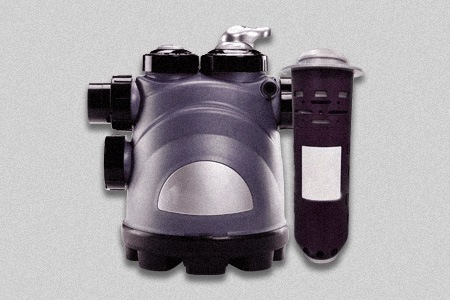
Mineral systems are becoming a very popular pool sanitizing method in recent years because not only are these pre-filled cartridge-based systems extremely easy to use and maintain, but they also help to reduce chlorine usage by 50%.
These systems are attached to the pipes of the pool system and contain alloys or minerals that can help to kill microorganisms and algae as the water flows via the chamber.
Some models even combine salt and minerals to soften and clean the pool water, acting as water softener alternatives for your pool. While this system reduces the use of harsh pool chemicals, it still uses chlorine.
The cartridges are quite expensive and in the case of large pools, the cartridges must be replaced frequently. It can be expensive as one of the pool chlorine alternatives for bigger swimming pools.
Non-Chlorine Shock
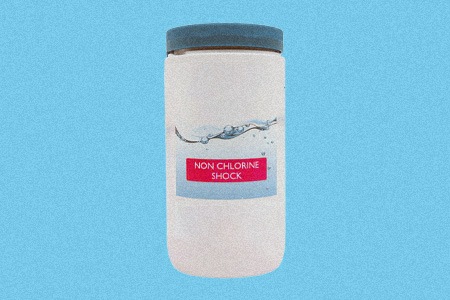
This is an excellent method to oxidize organic contaminants in the pool water such as sunscreen, body oil, sweat and urine.
However, on its own, non-chlorine shock can’t sanitize the pool and requires chlorine or some of the additional sanitation methods.
When the contaminants are oxidized, it helps to keep the levels of chloramines very low, which allows the chlorine to work better. Typically, for outdoor pools, the sunlight helps to oxidize the organic contaminants.
So, a non-chlorine shock is an excellent option for indoor pools where there is little or no sunlight or for swimming pools having heavy traffic. But do follow the guidance regarding how long after shocking the pool should you wait to swim again.
This method is also popularly used in modern types of hot tubs and spas to oxidize the organic matter, which enables the sanitizer to kill harmful bacteria, algae and other microorganisms.
Ionization
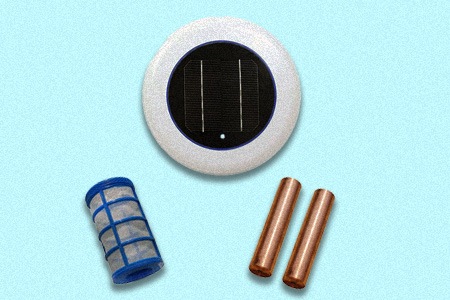
An ionizer comprises two metals, mostly silver, which is a disinfectant and copper, which works as an algaecide. The ionizer makes use of a low-voltage current to charge the metals, which are released into the pool water.
The positive charge attracts the germs, bacteria and algae and converts them into larger compounds, which are then removed by the pool’s filtration system.
You may have to use a small amount of bromine or chlorine in the pool water to clean it. However, ionizers may not be a great choice if you’re looking to reduce or completely eliminate the use of chlorine.
An ionizer depends on moving water and so, the pool pump must be operated continuously so that the sanitation continues. Also, an ionizer may not be able to handle very high dirt levels. As far as completely non-chlorine pool options go, this is a good one.
An increased metal level in the water can turn your fingernail beds and hair green and also stain your swimming pool. Ionizers are expensive and the metal will require regular replacement, not to mention the cost of running the pool pump round the clock.
PHMB
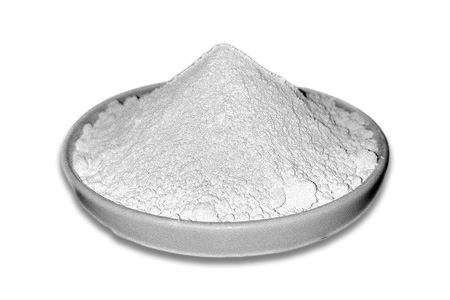
PHMB or polyhexamethylene biguanide is a good alternative to pool chlorine. In fact, this is the only method that eliminates the use of chlorine completely.
PHMB is more stable compared to chlorine and isn’t affected by sunlight, which means that it doesn’t need a stabilizer. Moreover, PHMB does not damage the floor and walls of your swimming pool even if you're using types of tile, nor does it irritate the skin or eyes.
PHMB, as one of the pool chlorine alternatives, helps to disinfect your pool by penetrating the cell walls of the bacteria, which causes them to burst from inside.
The PHMB then wraps the bacterial remains in a heavy gel and sinks to the bottom of the swimming pool. It is then sucked up by the pool’s vacuum system and eliminated.
However, since PHMB doesn’t have oxidative properties, you will need a chemical like hydrogen peroxide for this.
You also need to clean the pool filters every 4 to 6 weeks and use a separate algaecide. And, since PHMB isn’t compatible with chlorine, you will have to drain the entire pool before using PHMB.
This method is more expensive compared to chlorine and the maintenance cost is higher too.
When swimming in a pool treated with PHMB, you must ensure that your swimming suit or skin doesn’t have any traces of chlorine, because any chlorine present will react with PHMB and emit a yellowish-colored vapor.
Ultrafiltration
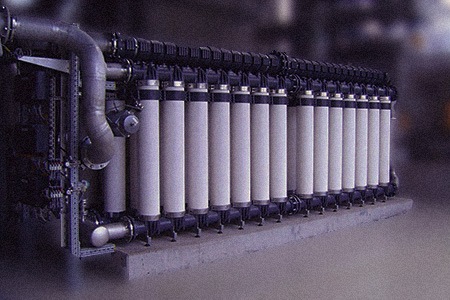
This process makes use of a very fine sieve or a filter to remove hair, fragments of human skin, small microbes, etc. once the basic filtration process is completed.
All the organic material, suspended particles and bacteria are trapped and eliminated by the ultra-filtration process. These systems are as close to alternatives to chlorine pools as you may get.
The ultrafiltration system consists of filter tubes equipped with very thin and fine membranes through which the water is circulated at very low pressure.
The membranes comprise extremely thin, semi-permeable pores via which some salts and essential disinfectants get back into the pool, which facilitates the cleaning and purification of your pool, without the use of harsh pool chemicals.
However, ultrafiltration technology is quite expensive among the pool chlorine alternatives and chlorine itself.
UV Light

You can sanitize your pool by using a combination of UV light and chlorine. While the UV light helps to disinfect the pool water by destroying the germs, the chlorine helps to maintain the residual effect.
A UV light system can help to reduce the amount of chlorine you will require to use and it also helps to reduce the chloramines, which causes the chlorine pool smell.
You must get a proper-size UV light by calculating your pool’s flow rate. The proper size of UV light can help to destroy all the harmful pathogens in the pool.
However, since UV light doesn’t provide any residual sanitation, several microorganisms can reproduce more quickly as compared to how fast the water is circulated via the device and the pool.
Reducing Water Temperature
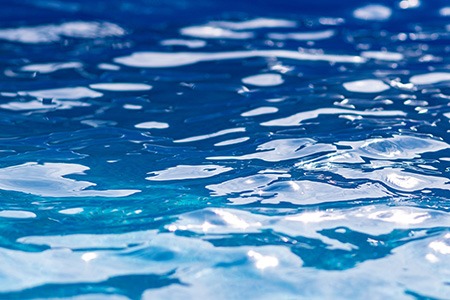
Many people have an aversion to extra chemicals and anything straying away from seeming "natural". For those people, you can simply try to keep the temperature of your pool water lower.
This means turning off any water heating, bright bulbs and lights, and covering and keeping the water in the shade. It could even involve growing trees for shade, though you'll have to combat extra leaves and sticks in the pool.
The reason this works is because bacteria and algae grow faster in warmer temperatures. The truth is you won't cut the amount of chemicals you need completely but you can drastically reduce the amount.
Pristine Blue
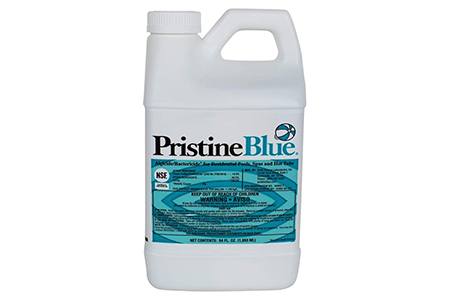
Earth Science Laboratories developed this proprietary algaecide and bactericide for pools. It's EPA regisered, NSF certified, and is eco-friendly. It's chlorine-free. The instructions say to use it every two weeks and your water will remain crystal clear and sparkling.
The main ingredient is copper sulfate pentahydrate, which has positively charged copper ions (much like the Ionization option above) that interact with and destroy the negatively charged bacteria and algae. These products are easy chlorine alternatives for swimming pools.
Pool Chlorine Alternatives to Clean Up Your Water
So, if you have a pool in your home and are looking for a better pool chlorine alternative that will work better and more effectively, then as we have discussed above, there are many better and healthier options.
While some alternatives may not completely eliminate the need for the use of chlorine, they still help to reduce the amount of chlorine being used significantly, which is a good thing.
However, before you decide to install a pool purification system, it is best to get a professional opinion so that you can decide the best pool chlorine alternatives for your family and you.



